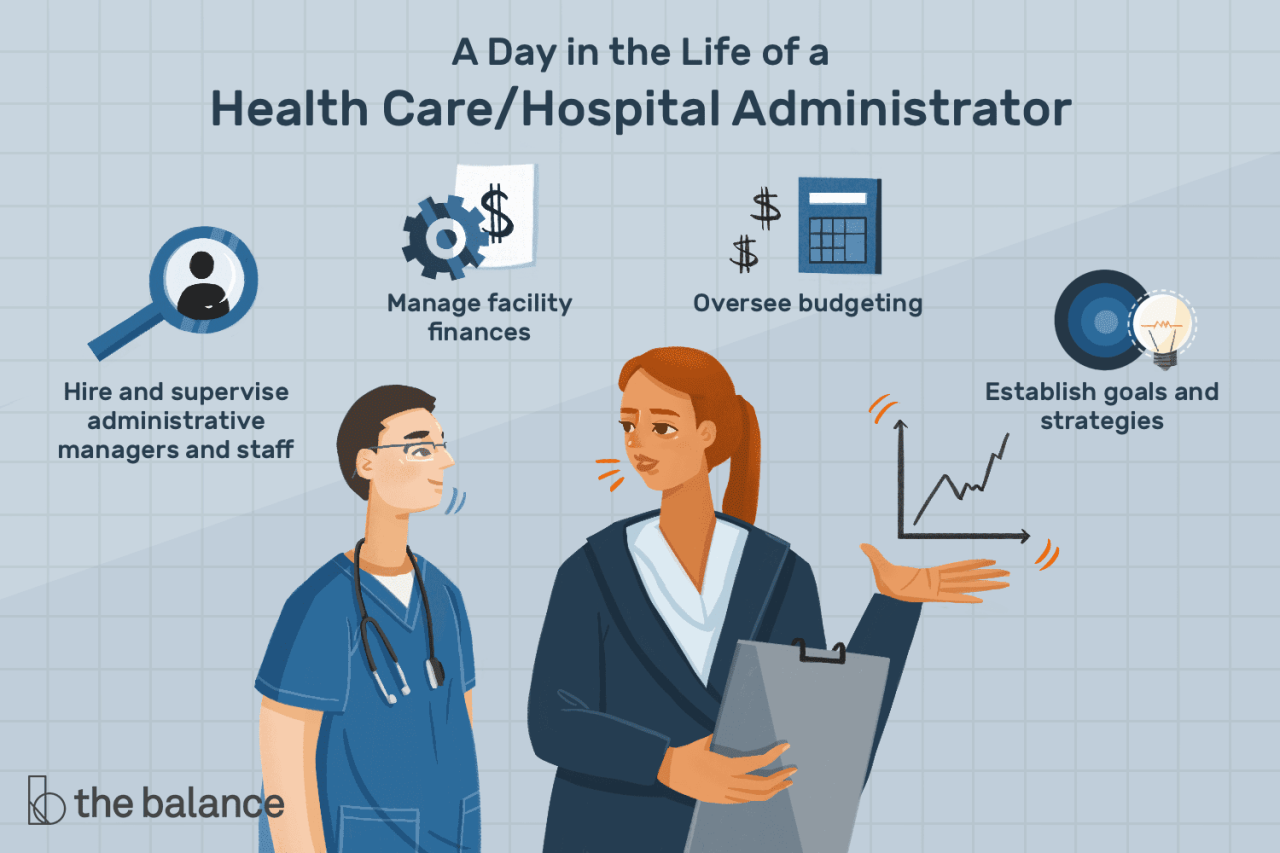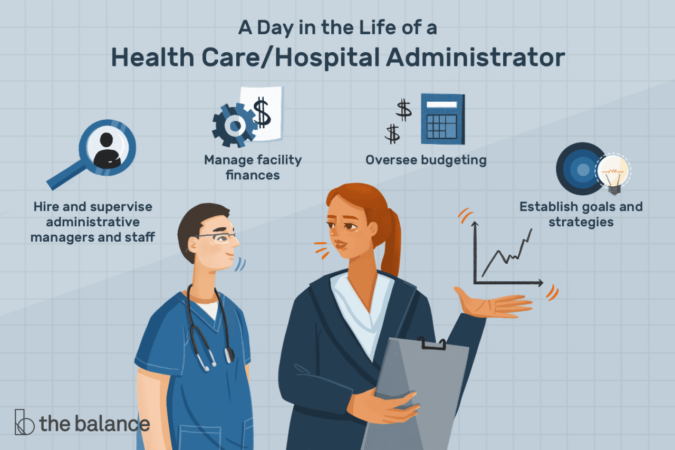
Job Description
Health care administrators play a critical role in the healthcare industry. They are responsible for managing the day-to-day operations of healthcare organizations, including hospitals, clinics, and nursing homes. They also work with physicians, nurses, and other healthcare professionals to ensure that patients receive quality care.
The primary responsibilities of a health care administrator include:
- Developing and implementing policies and procedures
- Managing budgets and financial resources
- Hiring and managing staff
- Ensuring compliance with regulatory requirements
- Providing customer service
Health care administrators may also be responsible for specific areas of operation, such as patient care, finance, or human resources.
Levels of Responsibility
There are different levels of responsibility within the field of health care administration. Entry-level administrators may be responsible for managing a specific department or program. Mid-level administrators may be responsible for overseeing a larger operation, such as a hospital or clinic. Senior-level administrators may be responsible for the entire healthcare organization.
Education and Training
To become a health care administrator, a bachelor’s degree in health care administration or a related field is typically required. A master’s degree in health care administration (MHA) is becoming increasingly common and is highly recommended for those seeking to advance in the field.
Graduate-level programs in health care administration provide a comprehensive understanding of the healthcare system, including finance, operations, policy, and leadership. These programs also offer opportunities for practical experience through internships and residencies.
Certifications and Professional Development
Certifications and professional development are essential for healthcare administrators to stay up-to-date on industry trends and best practices. The American College of Healthcare Executives (ACHE) offers the Fellow of the American College of Healthcare Executives (FACHE) credential, which is the highest level of certification for healthcare executives.
Other certifications available to healthcare administrators include the Certified Healthcare Executive (CHE) credential from the American Health Information Management Association (AHIMA) and the Certified Professional in Healthcare Quality (CPHQ) credential from the National Association for Healthcare Quality (NAHQ).
Professional development opportunities for healthcare administrators include attending conferences, workshops, and seminars. These events provide opportunities to learn about new technologies, best practices, and industry trends.
Skills and Competencies

Effective health care administrators possess a diverse skillset that empowers them to lead and manage complex healthcare organizations. Leadership, communication, and problem-solving abilities form the cornerstone of their success.
Leadership Skills
Leadership is paramount for healthcare administrators, as they are responsible for guiding teams, motivating staff, and inspiring innovation. They must possess the ability to establish clear goals, delegate tasks effectively, and foster a positive and collaborative work environment.
Communication Skills
Healthcare administrators must be adept communicators, capable of conveying complex information clearly and concisely to diverse audiences. They must be able to build rapport with patients, families, staff, and stakeholders, fostering trust and understanding.
Problem-Solving Skills
Healthcare administrators encounter a myriad of challenges that require analytical thinking and problem-solving abilities. They must be able to identify issues, gather data, evaluate options, and implement solutions that improve patient care and organizational efficiency.
Technology Proficiency and Data Analysis Skills
Technology is rapidly transforming the healthcare industry, and administrators must be proficient in utilizing health information systems, data analytics, and other technological tools. These skills enable them to make informed decisions based on data-driven insights, improving patient outcomes and optimizing resource allocation.
Industry Trends
The health care industry is constantly evolving, driven by technological advancements, regulatory changes, and demographic shifts. These trends are shaping the role of health care administrators, who must adapt to meet the changing needs of patients, providers, and stakeholders.
Technology is transforming health care delivery in numerous ways. Electronic health records (EHRs) are improving patient care by providing clinicians with access to comprehensive patient information. Telemedicine is expanding access to care for patients in rural or underserved areas. Wearable devices and remote monitoring systems are empowering patients to manage their own health. These technologies are increasing efficiency, improving quality, and reducing costs.
Regulatory Changes
Regulatory changes are also having a significant impact on health care administration. The Affordable Care Act (ACA) has expanded health insurance coverage to millions of Americans and introduced new regulations for health care providers. Other regulations, such as the Health Insurance Portability and Accountability Act (HIPAA) and the Stark Law, impose strict privacy and billing requirements on health care organizations. Administrators must stay abreast of these regulations to ensure compliance and avoid penalties.
Demographic Shifts
Demographic shifts are also affecting health care administration. The aging population is increasing the demand for long-term care and geriatric services. The growing diversity of the population is creating a need for culturally competent care. Health care administrators must address these demographic changes by developing new programs and services that meet the needs of an increasingly diverse patient population.
Health care administrators are adapting to these changes by embracing new technologies, staying abreast of regulatory changes, and addressing the needs of a changing population. They are also working to improve the quality of care, reduce costs, and increase access to care. By doing so, they are helping to ensure that the health care system is prepared to meet the challenges of the 21st century.
Career Outlook
The job outlook for health care administrators is expected to be excellent in the coming years. The aging population and the increasing prevalence of chronic diseases are driving the demand for health care services, which in turn is increasing the demand for qualified health care administrators.
Factors Driving Demand
Several factors are contributing to the growing demand for health care administrators, including:
- The aging population is leading to an increased demand for health care services, as older adults are more likely to experience chronic health conditions that require ongoing care.
- The increasing prevalence of chronic diseases, such as heart disease, cancer, and diabetes, is also driving the demand for health care administrators, as these conditions require complex and coordinated care.
- The growing complexity of the health care system is making it more difficult for providers to manage their operations efficiently. Health care administrators are needed to help providers navigate the complex regulatory environment and to develop strategies to improve quality of care and reduce costs.
Career Advancement Opportunities
Health care administrators have a wide range of career advancement opportunities. With experience, they can move into senior leadership positions, such as hospital CEO, chief operating officer, or chief financial officer. They can also specialize in a particular area of health care administration, such as finance, operations, or human resources.
Salary and Benefits
Health care administrators earn a competitive salary, with the median annual wage being $104,280 in May 2021, according to the U.S. Bureau of Labor Statistics (BLS). The top 10% of earners made more than $169,130, while the bottom 10% earned less than $60,730.
Factors Affecting Salary
Several factors can affect a health care administrator’s salary, including:
- Experience: Administrators with more experience typically earn higher salaries.
- Education: Those with advanced degrees, such as a master’s or doctorate in health care administration, generally earn more than those with only a bachelor’s degree.
- Location: Salaries can vary depending on the region of the country, with administrators in urban areas typically earning more than those in rural areas.
- Employer: The type of employer can also affect salary, with administrators working for large hospitals or healthcare systems generally earning more than those working for smaller organizations.
Benefits
In addition to a competitive salary, health care administrators typically receive a range of benefits, including:
- Health insurance
- Dental insurance
- Vision insurance
- Paid time off
- Sick leave
- Retirement plans
- Tuition reimbursement
- Continuing education opportunities
These benefits can vary depending on the employer, but they are typically designed to attract and retain qualified health care administrators.
Work Environment
Health care administrators typically work in office settings, with frequent interactions with medical staff, patients, and their families. The work environment can be demanding, requiring long hours and the ability to handle multiple tasks simultaneously. However, it also offers the opportunity to make a real difference in the lives of others.
Challenges in a health care setting include dealing with complex regulations, managing budgets, and ensuring the quality of patient care. Administrators must also be able to adapt to the ever-changing landscape of the health care industry.
Rewards
- Making a difference in the lives of others
- Working with a team of dedicated professionals
- Learning about the latest advances in health care
- Earning a competitive salary and benefits package
Work-Life Balance
Maintaining a healthy work-life balance can be challenging in the field of health care administration. However, it is important to remember that taking care of oneself is essential for being able to provide the best possible care to patients.
There are a number of things that health care administrators can do to improve their work-life balance, such as setting boundaries, delegating tasks, and taking breaks throughout the day.





